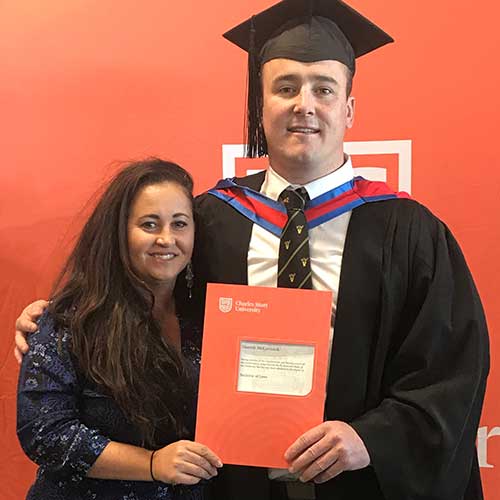At the age of 27, Hamish McCormack wondered how to make a career change. And his two careers couldn’t be more different. An electrician by trade, Hamish decided to make the switch and explore a career change to law.
“I was getting a bit fed up with my trade. I wasn’t really enjoying what I was doing, so I started to look for other opportunities. And you have to think about the future. You can’t go crawling through people’s roofs for the rest of your life. I had been unhappy for six months, so I spoke to some friends and their advice was to find something I was interested in and just go and do it. I was lucky enough to be at a good stage of my life; I hadn’t had kids yet, so I was able to have a go at something new.
“At the same time, Charles Sturt University had just built a campus at Port Macquarie. I didn’t have an exact plan of what I wanted to do, I just knew I didn’t want to be in a trade anymore.”
Hamish chatted to Charles Sturt’s advisers about his career and study possibilities. They assisted him to apply for a Bachelor of Arts1. But it seemed law was in his blood, with more than a few of his family members in the profession. When he began to question his future work life, the idea of a career change to law was rattling around his head.
“I mentioned to the Charles Sturt advisers that I had an interest in doing law. They explained that the first law classes were to begin the following year. Two of my cousins had just finished their law degrees and that spurred me on to give it a go.”
Changing uni courses is always an option
So, after successfully completing the first few subjects of his liberal studies degree, which were law-based, Hamish was able to transfer into a Bachelor of Laws. The good news? The study he had already done counted towards his new degree!
Got an idea of what interests you but not sure what to study at uni? Charles Sturt’s Bachelor Arts might be the ideal starting point for you. It’s a broad course that could provide a pathway to another university degree once you’re certain of your direction. Choose from a wide range of subjects that can count towards your qualification and get you set for a career change.
We asked Hamish for his thoughts on changing careers and starting uni a bit later in life.
Studying full-time, working part-time
Once he committed to making a career change, Hamish threw himself into his degree. He decided to study full-time and work part-time.
“I’d pick up a day or two of work from my old company or from a few places around town. But that was only in my spare time, during uni holidays or over the summer break.”
Hamish acknowledged that at the start of his study, the age-old issue of time management was an obvious challenge for him. He knew he’d have to work super hard on organising his time so he could tick off his study tasks and ensure they were being done to the best of his ability.
But the ‘comfort zone conundrum’ was one challenge he hadn’t anticipated. Hamish was knowledgeable and experienced as a tradie. Setting his sights on a new career, shaking things up, meant he was about to disrupt his comfort zone.
“It was a bit of a shock to the system. I went from doing my trade – which I knew pretty well after a decade – to starting brand new in something else. It made me second guess myself at the beginning. But by the end of my first year of study I got into the swing of things.
“Learning to ask for help was probably my biggest problem. I was pretty confident in my trade and then I found myself having to ask people for help or a bit of direction. But the other students helped me work through that. Speaking with them about what they were experiencing and what helped them get through their subjects was great.”
Getting connected at intensive school
Hamish found a lot of value in attending the intensive schools. They were a learning experience where he covered a lot of ground and had the opportunity to ask plenty of questions from both lecturers and industry experts. And the chance to meet fellow students and lecturers in person was also a great boost to Hamish.
“After studying online, intensive schools were the perfect chance to put a face to a name. Doing a few intensive schools made things a little easier. Firstly, they help you to build your network and get to know each other a little bit better. I’m opposite to a lot of people who prefer writing an email or sending a message – I found it easier to converse face-to-face when it comes to tasks or assignments.
“At one intensive school a bloke organised dinner. Teachers and students were there and we all got along really well away from the study environment. That’s when I realised that I may have missed out, at the start of my degree, by not getting as involved as I could. I came to understand that the teachers are actually there to help you get through the work. So, ask questions. Otherwise they’ll never know you are struggling.”

Grads like Hamish get jobs – quickly
According to the latest QILT Graduate Outcomes Survey, Charles Sturt is the #1 uni for grads who get jobs. It’s true – just ask Hamish. Armed with his trade background and a soon-to-be-finished Bachelor of Laws, he began to canvass for jobs in the legal profession. He came up trumps two months before he actually graduated!

“I had a bit of a look around my town, to get a feel for who was doing what, and I found a company that had recently opened a new office. It was construction and infrastructure based – which is my whole trade. So, I made contact with the director and after the interview he offered me a role as a paralegal. I hadn’t even got my degree yet!”
It was the perfect marriage of the old and the new. Trade skills combined with his bachelor’s learning put him in a prime position to create a fresh future.
“I’m thoroughly enjoying my work now. For example, it’s very interesting to be working in a new way in an industry I’ve been in most of my career. I can’t see myself wanting to do anything but construction law.”
It’s time for a career change
Hamish knew it was time for a change. However, it’s important, he says, to pick just the right time to make your move. That is to say, not too early and not too late. He didn’t wait until he had a detailed, exact plan in place. But he did give himself time to listen as the discontented voice in his head became louder.
And he has another word or two of advice.
“Pick something that you’re interested in. There’s no use making a change if you’re not going to enjoy what you do next. Once you pick, stick with it.
“And also make sure you have the support of your family and friends before you change. They can help you when you begin to second guess yourself and doubt what you’re doing!”
Discover how to make a career change?
At Charles Sturt University, we’re all about getting things done. You can be too. Perhaps, like Hamish, you’re keen on a career change to law, or another field where you can give back to the community. On the other hand, you might simply want to try something new. Wherever you want to take your career, we’ve got practical, hands-on courses to get you there. It’s what we do at Charles Sturt.
Contact our team to discuss where we can help you go next.
1Cricos: 000649C


You must be logged in to post a comment.